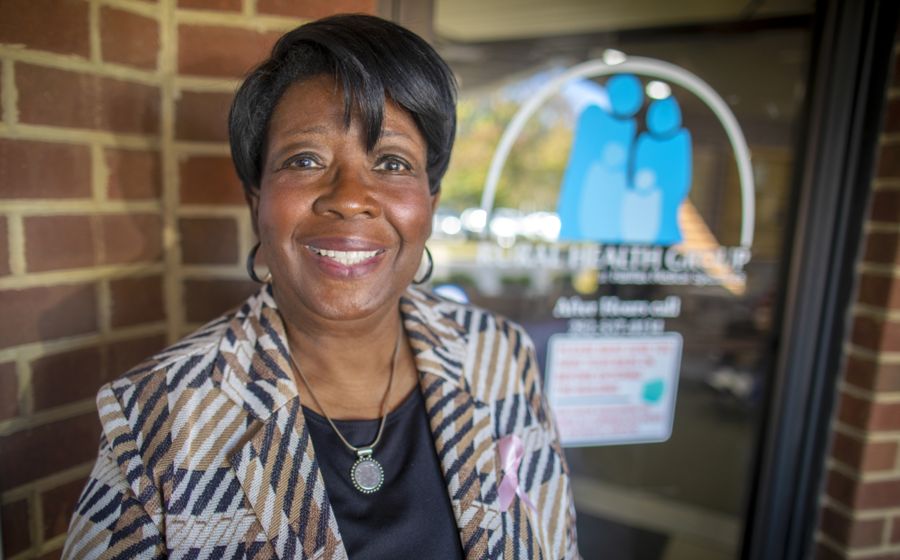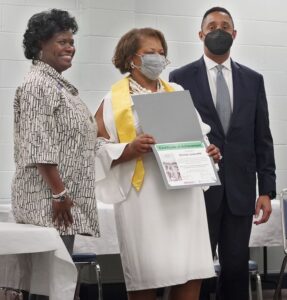Community Voices Trains Grassroots Leaders and Problem Solvers

Patricia Peele, a health educator and outreach coordinator for the Rural Health Group in Halifax County, stands in front of their office in Roanoke Rapids. Peele is a big proponent of Community Voices, an Extension at A&T program designed to help citizens develop into community leaders.
HALIFAX COUNTY, NC – Patricia Peele likes to quote poet and civil rights activist Maya Angelou when she talks about the value of Community Voices, an Extension at A&T program to help citizens develop into community leaders.
“When you know better, you do better,” said Peele, quoting Angelou.
“It’s about giving people the confidence they need to take the steps toward making change,” she continued. “A lot of people have the desire to help their community, but they are reluctant because they have no knowledge, no tools. This training gives them confidence and teaches them what leadership is all about.”
Peele works as outreach education director for the Rural Health Group in Halifax County, a mostly rural area in northeastern North Carolina, where residents struggle with poverty and a lack of healthcare and social services. Her experiences with Community Voices dates to the 1990s, when she was an Extension Community and Rural Development (CRD) agent in Beaufort County. The county became the first to deploy the new program created by Extension at A&T with support from the W.K. Kellogg Foundation. When Peele left Beauford County, she took Community Voices with her and in her current role at the Rural Health Group, Inc. in Roanoke Rapids, she has helped create a team of Community Voices “graduates,” called Community Fellows, who share a philosophy and a commitment to community service.
“The fellows have become like a fraternity,” said Peele. “They understand the philosophy of shared leadership that is needed in our communities. We’ve been conditioned to authoritarian leadership, but this is so different. You have to work with people and meet them where they are.”
Community Voices is grassroots leadership training program offered in four modules aimed at limited-resource and other non-traditional leaders and organizations. Participants learn to solve community problems through hands-on learning that teaches problem-solving strategies, developing a shared vision and communication skills. The course also helps participants understand the structure of local governments and nonprofit organizations so they can work with them to address mutual concerns.
“More than anything, Community Voices helps you develop a support system,” said Belinda Jones Hill, coordinator of the Roanoke Valley Breast Cancer Coalition and a graduate of the program.

Belinda Jones-Hill, center, poses with Michelle Eley, left, Community and Economic Development Specialist at N.C. A&T, and Norlan Graves, Superior Court Judge of District 6A, during the graduation ceremony of the Roanoke Valley Community Voices program in Dec. 2021. Photo by Richard Holm, news editor of The Daily Herald of Roanoke Rapids
“We talked about how to build consensus and we did a lot of outreach,” she said. “Some people canvased to get the word out about clinics.” Group members also created a podcast and put up a billboard along I-95 that encouraged people to get vaccinated “because you matter.”
Jones Hill has received two additional grants since her Community Voices training in 2021—one to continue COVID-19 vaccinations and one focused on fighting flu. She hopes to expand the outreach effort to the most rural areas of Halifax County and realizes that the long-term solution to overcoming vaccine hesitancy will be eliminating health inequities and building trust in the healthcare system.
“Health inequities existed long before COVID, and that’s one reason why people don’t want the shots,” she said. “Because of mistrust in the system people say, ‘You can’t even give me dental care and now you want to give me a shot? I don’t want your free shot.’ That’s the attitude we are dealing with, and you have to respect that.”
Jones Hill hopes to organize another Community Voices program through the Breast Cancer Coalition targeting southeastern Halifax County and to engage graduates in general health and wellness efforts.
Peele estimated she has worked with nearly 100 Community Voices participants over the years. One of the 2021 participants was her son, 4-H Honor Club member Jared Peele, who created a rap video called “Tell Me the Truth” to encourage young people to get vaccinated. The video caught the attention of the UNC Alliance, a program at the University of North Carolina at Chapel Hill that addresses issues of equity and justice, which set him up in a studio and had him produce another rap track.
For her next project, Peele plans to put together a countywide forum that will bring together different communities and cultures to develop a shared vision for health and wellness. That event will use the Community Voices model to determine needs and develop strategies for closing the gap between health and wellness goals and current realities.
“In Halifax County, you need to know the audience and how to reach them,” she said. “In African American communities, the oral tradition is important—that’s why rap music and podcasts are important. We are a poor county down at the bottom in terms of health outcomes, but sitting at a table and handing out brochures won’t move the needle forward.
“We need to come out from behind the table and engage with people. We need to build sustainability and move our county forward through our own people.”


